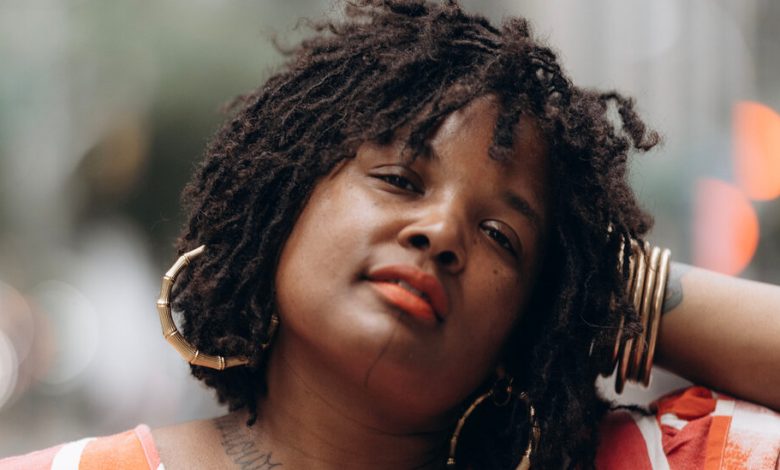Gen Z Wants Feminine Care Brands to Just Say Vagina

On a recent July evening in Midtown Manhattan, a trio of teenage girls swooped into the feminine care aisle at Target. Skipping over the boxes of Always and Tampax tampons, they made a beeline to a shelf with sanitary pads from the Honey Pot Company. One asked her friend if she was going to pick out the pads with a “minty sensation.”
The herbal pads, which are advertised as providing soothing comfort during menstruation, have been fodder for many videos on TikTok. In posts that have racked up thousands of likes, women wearing the pads bounce around with startled looks and compare the sensation to applying Icy Hot cream. (Some even have their boyfriends try it.) Others say they hate the feeling and the pads need to come with a warning.
Regardless of whether consumers like the product, the Honey Pot Company and a raft of other new brands have people talking publicly about a topic that’s often been kept hush-hush: women’s genital health.
The girls at Target debated the merits of various pad options — “You’re not getting it just because it’s pretty,” one girl reminded the group — and then they bought a purple-and-white package of the Honey Pot’s overnight pads, which listed mint, lavender and aloe as ingredients.
The conversation taking place online had not only moved into the store, it had translated into a sale. Destigmatization, in other words, is good for business. And a younger group of consumers is eager to have a more personal relationship with the brands they use for their most intimate bodily care.
The mass retailers that stock these upstart feminine care brands are thrilled that they bring in their own customer base. But critics, including gynecologists, say that despite the updated marketing, products like vaginal washes and sprays run the risk of capitalizing on the untrue — and potentially harmful — trope that vaginas are unclean and need fixing.
The Group Chat Approach
The Honey Pot Company is the brainchild of Beatrice Dixon, 40, who founded the brand in 2014 after making a cleansing wash that she said helped treat her recurring bacterial vaginosis.
Cleansing wipes, herbal menstrual and incontinence pads, panty sprays, lubricants and supplements for “urinary tract support” followed as the company grew. The Honey Pot products are now sold in 30,000 stores in the United States, including Walmart, Target, Kroger and Walgreens; within a decade, the brand has helped change mass retailers’ staid feminine care aisles, which have long been dominated by faceless conglomerates that put out muted packaging and TV commercials that euphemistically used blue liquid to represent menstrual blood.
“All these companies now are trying to be hip and colorful and just really destigmatize these products,” said Leslie Schrock, an investor with several portfolio companies in the women’s health sector and the author of books on pregnancy and fertility.
Call it the “group chat” approach — unfiltered, real talk — that now shows up across the industry.
August, a menstrual product company, was founded in 2020 by Nadya Okamoto, who was frustrated by the lack of open conversations about periods while she was working with national feminine care brands as a Generation Z-focused marketing consultant. Ms. Okamoto, 25, said she wanted her brand to have the voice of “the big sibling that you think is cool and knowledgeable and if you have questions, they will always keep it real with you.” August’s Instagram and TikTok posts include women sharing embarrassing moments they’ve had while menstruating, and comparing pad wrappers to Birkin bags.
August products are now sold in more than 400 Target stores. Companies like Here We Flo — which sells reusable period pants and biodegradable period pads — and Tabu — which sells vibrators marketed “to increase comfort and stimulate blood flow, which helps maintain vaginal health” — have also made it to mass retailers, and have a similarly direct voice on social media. Here We Flo’s slogan is “Life Gets Messy: We’ve got your back. (And your front!)”
Even products regulated by the Food and Drug Administration are getting on this train. Julie, a two-dose emergency contraceptive that went on sale last September, wants customers to think of the brand as their “best friend’s cool big sister,” said Amanda E/J Morrison, a Julie co-founder.
In a recent commercial, two women race to grab the last pack of Julie on a store’s shelf. They spar over who deserves it more. (“My boyfriend has a podcast about crypto,” one woman says. The other counters: “Mine puts cologne on his forehead.”)
“Most brands — when pharmaceutical companies do create commercials — there’s a woman running in a field and then you just hear the voice over of side effects,” Ms. Morrison said. “We were like, ‘Well, what if it was funny? What if we talked about women’s health like women talk about women’s health?’”
Stalwart brands like Midol (the pain relief capsules for menstrual cramps) have also rebranded to meet the moment; in 2020, its drab blue-and-white boxes were redone in an attention-grabbing bright yellow with a big, bold M.
At the Honey Pot Company, Ms. Dixon’s personal story is front and center. Ms. Dixon — who has said in interviews that her grandmother told her the ingredients in a dream — initially started making her washes in her Atlanta kitchen.
“There isn’t a ton of certifications, but there is a ton of life experience,” said Ms. Dixon, who is also chief innovation officer for the company.
At the time, she was working as a buyer for vitamin and body care products at Whole Foods. (She’d also worked as a pharmacy technician for more than a decade.)
Ms. Dixon found some of her first customers in the parking lot of Whole Foods by following them out of the store (“I know it wasn’t the right thing to do,” she joked) and gained a loyal following by selling at Black hair shows on the East Coast and throughout the Southeast.
“Black women really built our brand,” Ms. Dixon said. “You start off in a place you know.” (The company says 33 percent of its customers are Black.)
On social media, the brand goes irreverent: its meme-filled TikTok page includes posts about dealing with a heavy menstrual flow on a long-awaited Cabo trip, feeling embarrassed by sweating in the crotch, and the difficulty of advocating for yourself when you have uterine fibroids. The Honey Pot’s TikTok approach is Gen Z-chaotic: Being unpolished and comedic is the point. And yes, it uses red liquid to depict blood falling out of a menstrual cup.
Ms. Dixon and other Honey Pot executives assiduously use the term “humans,” rather than “customers,” which they point out acknowledges that not everyone with a vagina identifies as a woman. (Their slogan: “Made by Humans With Vaginas for Humans With Vaginas: Because It Takes One to Know One.”)
“We’ve had to kind of be a little edgy,” Ms. Dixon said. “When you look at the humans that we want to serve as a whole person, you kind of have to be edgy. You kind of have to go for that.”
‘That Aisle Has Notoriously Been a Problem One’
There are also potential land mines for new brands in an industry that, in part because much of it falls into a regulatory gray area, is relatively easy to enter.
Consider the case of Thinx, a company that makes period underwear. In 2015, it blanketed the New York City subways with sleek millennial-pink advertisements reading “Underwear for Women With Periods” next to a picture of an open grapefruit.
Thinx, whose founder said she loved “to talk about are the things you’re not supposed to talk about,” settled a class-action lawsuit last year that claimed its products contained harmful chemicals. (The company did not admit to liability.)
Feminine care products fall under something like an honor system in the United States. The U.S. Food and Drug Administration requires companies making low-risk medical devices, such as menstrual pads and tampons, to notify the agency that enough testing has been done in order for them to assert that their products are safe, but manufacturers do not need to actually demonstrate safety and effectiveness to the agency. Though products like washes and wipes are classified as cosmetics, and thus must list their ingredients on the label, menstrual products, like tampons or period underwear, don’t have to do so.
Gynecologists say women shouldn’t clean inside their vagina, but the marketing of these intimate washes — sold by the Honey Pot and other newcomers as well as long-established brands like Vagisil and Summer’s Eve — is confusing. They are specified for use outside the vagina, but are often advertised as balancing pH levels, which doctors say capitalizes on a general lack of consumer knowledge about women’s health. “A vulvar wash cannot maintain a healthy vaginal pH,” Dr. Jen Gunter, a gynecologist and author of “The Vagina Bible,” said. Vagisil and Summer’s Eve did not respond to request for comment.
In most cases, water and simple soap will do (and some experts say not to use soap or other products near the vaginal opening because it can cause irritation). For infections, there are over-the-counter and prescription medicines available. Doctors stress that douching, a method of internal cleansing, disrupts the vagina’s natural cleansing abilities. It has been linked in some studies to vaginal infections, an increased risk of sexually transmitted infections and fertility problems, and should be avoided, physicians say.
“If putting on a vulva moisturizer and using a special vulva wash makes you feel cared for and pampered, I don’t really have a problem,” said Dr. Gunter. “When the implication is that you need that because of a smell or you need that because your intimate area needs something special, then that’s when I start to have issues with that.” (Dr. Gunter, like other gynecologists, preaches this message on social media.)
“Anything with that many ingredients you want to be cautious of,” said Dr. Monica Woll Rosen, an obstetrician-gynecologist at the University of Michigan Medical School, referring to the Honey Pot’s wipes.
The Honey Pot doesn’t sell douches — though its intimate washes show up under the douche category on Walmart’s website — and says its washes, wipes and sprays are for external use only. Its labels on those products read “gynecologist-approved,” but the company leans on how a consumer might feel using them. (On its website, the Honey Pot highlights a clinical study of healthy women aged 18 to 75 in which 94 percent agreed that its amber sandalwood wash — supposedly for balancing pH levels — “left them feeling clean and confident” after one week of use.)
Dr. Tacoma McKnight, an associate professor emeritus of obstetrics and gynecology at Northwestern University’s Feinberg School of Medicine, said the fear of a smelly or unclean vagina has in some cases been passed down from an older generation, and now crops up on social media or blogs. Black women may receive these messages more. (In a 2002 study, 58.5 percent of Black women reported douching and 35.6 percent of Hispanic women said they did the same, compared with 26.6 percent of white women.)
“It’s a fine line,” said Dr. McKnight, that these companies “take advantage of.”
She added: “They certainly are saying the right things, because, yes, you do want people to feel good in that aisle because that aisle has notoriously been a problem one. But at the same time you’re still a part of the problem.”
Ms. Dixon said caution was important, and that the company began third-party clinical testing of its products in 2020. “We have to be conscientious of the claims that we’re making,” she said. Not just because of regulations, but because customers pay attention. In May 2022, the Honey Pot and Ms. Dixon were the target of an onslaught of social media criticism after the company changed the formulation of its washes to include phenoxyethanol, a chemical often used in cosmetic products to give products a longer shelf life, without first informing customers. (It also removed its claims that the product was “certified organic,” which alarmed customers, leading Ms. Dixon to film a 14-minute Instagram apology.)
“We don’t want to just be putting pretty labels on things and then just putting it out into the world,” Ms. Dixon said. “We are a very responsible brand and whatever we make has to work.”
Target Comes Calling
Around early 2016, when Honey Pot washes were being sold in some Whole Foods stores, Monique Benoit, a buyer from Target, reached out.
Target had been losing market share in the sanitary protection category, and Ms. Benoit was responsible for helping the mass retailer figure out how to reverse course.
Data showed people were interested in body products that had natural ingredients, but the national brands didn’t seem to want to introduce them. People wouldn’t try new products, she recalled being told by national brands.
Ms. Benoit turned to her hairstylist for advice about brands that might fit the bill of what she was looking for: organic, Black or female-owned, with a loyal following. Her stylist told her to “check out this dope sis named Bea.”
The Honey Pot’s natural products would sell, Ms. Benoit believed, but they needed a new look. Its white packaging reminded her of Summer’s Eve. That brand, long known for its douches, had faced pushback in recent years. Its attempts at a feminist rebrand were ham-handed; in 2010, the brand ran an ad that said women felt more confident asking for a raise at work if they started their day by showering with Summer’s Eve feminine wash.
Ms. Benoit helped the independently owned the Honey Pot through a redesign, and Target has featured the brand prominently in advertising campaigns, including one for a Black History Month commercial. It is now Target’s top-selling brand for intimate washes and wipes, the Honey Pot said, citing Nielsen data. (Target declined to confirm that data.)
The Honey Pot declined to share this year’s sales, but in 2022, the brand had more than $100 million in annual revenue, according to a person familiar with its financials.
The brand’s presence in stores can bring in new customers. Fifty-five percent of people who buy the Honey Pot products at Walmart haven’t shopped there previously, according to Laura Tedesco, the Honey Pot’s chief strategy and marketing officer. Walmart declined to comment.
An Underserved Market
As Honey Pot won over retailers, it needed more capital to grow.
In early 2020, Benjamin Schmerler, an investor at Sunu Capital, a venture capital firm that specializes in early-stage start-ups focused on inclusion and sustainability, hopped on the phone with Ms. Dixon. Mr. Schmerler is usually on calls like these with founders of financial and technology companies who are using jargon like “take rates,” not discussing vulvas, he said.
He got over his initial shock at Ms. Dixon’s frank language, and Sunu made its largest investment to date — $1 million to the Honey Pot. He has given an additional $2 million since then.
There are smaller brands still looking to break into brick-and-mortar sales that see Ms. Dixon and the Honey Pot’s experience as the blueprint. Lauren Lee, chief executive of Semaine Health, which sells supplements for menstrual and endometriosis pain, has turned to Ms. Dixon for fund-raising advice (a Target buyer put them in touch), and Ms. Dixon sits on her advisory board, giving Ms. Lee credibility among the investors and companies she’s pitching.
“People watched her success, and then were more willing to take the risk on smaller brands like ours,” Ms. Lee said. Recently, Walgreens and the grocery chain H-E-B began selling Semaine products. (Gynecologists say individual ingredients in vaginal health supplements may be helpful, but the data is weak on those ingredients, and the exact amount of each ingredient in a given supplement isn’t clear.)
“It can be quite difficult to break into these retailers,” said Ms. Schrock, the investor who focuses on feminine health technology. But she said the slew of new feminine care products headed to market was driven by demand. “Women want to take more control of their health, they’re interested in these topics, they want to have choice.”
And, said Ms. Dixon, there’s plenty of opportunity as a result. “Humans that have vaginas are still an underserved community,” she said.



